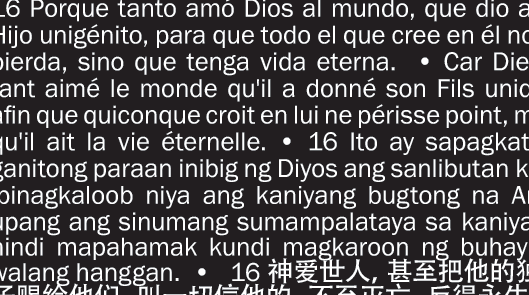Using Scripture in Multilingual Churches

by Annette R. Harrison
Communication is more than content. It is also media, or the channels and ways in which content is communicated. This fact is crucial for church leaders and other Christians in our increasingly diverse and pluralistic society. The challenge is how to present a church unified around the truth of God’s word, yet diverse in its expressions of worship, and in its affirmation of each personality.
Communication is more than content. It is also media, or the channels and ways in which content is communicated. This fact is crucial for church leaders and other Christians in our increasingly diverse and pluralistic society. The challenge is how to present a church unified around the truth of God’s word, yet diverse in its expressions of worship, and in its affirmation of each personality.
Access to the truth of God’s word is a challenge in the Central African region where I most recently served with Wycliffe Bible Translators. There are approximately 313 languages spoken in the four-country region. Close to half of these languages are unwritten, and their speakers do not have access to scripture they can adequately understand.
We call these languages “mother tongues,” but the Congolese call them banzinga ya mboka, “village languages” (though their speakers may sometimes live in cities). To us, the number of languages represented a clear imperative for translated scriptures in each one. Yet, the African church leaders, evangelists, and lay people with whom we were attempting to build working partnerships for Bible translation did not seem as inspired or compelled by this cultural and linguistic diversity. Most of our suggestions, initiatives, and plans fell by the wayside due to inaction. It seemed the more we advocated for the crucial role of scriptures in village languages, the more pastors and evangelists retreated from the idea.
The Conundrum
Although we couldn’t understand what appeared to be passive-aggressive behavior on the part of African Christians, we also believed that people have good reasons for their behavior. A study of worldviews demonstrates that patterns in outward action can be a clue to the beliefs and value systems buried beneath the surface.
Christians in Central Africa certainly value the Bible. The Congolese Bible Society has a difficult time keeping the French Louis Segond version in stock because it sells quickly. There are at least two translations of the Sango Bible in Central African Republic; there are also two Lingala Bible translations that serve the Democratic Republic of Congo (former Zaire) and the Republic of Congo. Lingala and Sango are both known as “Languages of Wider Communication” because they are spoken as the language of inter-group communication, and they are not the ethnic heritage languages of any group.
Further, after the Kituba New Testament was dedicated in January 2006, my husband and I helped with the distribution process. Kituba is a third Language of Wider Communication in the area. At one of the larger Protestant churches in Brazzaville, we ran out of New Testaments and were scolded by disappointed would-be buyers for not having enough copies to sell. Clearly, Christians value and use these Bibles. However, leaders of this same church were among those whose support of Bible translation into the village languages of their own parishioners was lacking.
In order to understand this apparent contradiction of Christians who valued scripture, yet did not seem to value the translation of it into village languages, my team and I designed a project to discover a “market niche” for village language scriptures. We wanted to know all the different ways (media) that communication happened in the life of a church: what kinds of activities and “products” did the pastors and parishioners use, and what languages did they use for those activities and products?
We reasoned that if we could discover where village languages already had a place in the life of a church, we would be able to identify where scripture in village languages would most likely be welcomed. It would give us a starting place to introduce Congolese Christians to the power of God’s word in their own village languages.
How We Proceeded
Our team was small and limited, but over time we had all been able to become part of different networks of contacts within Congolese communities. Therefore, we developed a way for us and for our friends to systematically observe what went on in as many churches as possible, on as many days as possible. We also interviewed denominational leaders, pastors, and evangelists and distributed questionnaires within the churches for parishioners to fill out. These questionnaires were designed to tell us something about how individuals used scripture in their personal devotions and regular family activities.
We gathered data in the three largest cities in the Republic of Congo, from the five largest church denominations. Two-thirds of the Republic of Congo’s population lives in the cities where we gathered data. Two of the denominations were those that had sent the first missionaries to the Republic of Congo—the Catholic Church in the sixteenth century, and a Swedish Baptist mission which founded the Evangelical Church of Congo in the nineteenth century. Because these two denominations are so well established, they also keep very good records of church attendance. Several of the churches where we observed count upwards of one thousand people in a single church service on any Sunday morning.
What We Discovered
We discovered that the majority of the times when scripture was read or taught in church services, two kinds of languages were used: the language in which the church leader had theological training and access to Bible study tools such as concordances, dictionaries, and commentaries (i.e., French), and the languages most widely understood within the congregation (i.e., Lingala and Kituba). But when the congregation sang and when choirs led worship or performed special numbers, and during all-night prayer vigils or times of personal testimony, village languages were used. In fact, we counted upwards of fourteen different languages in these contexts.
The patterns in our data are suggestive of two priorities for African church leaders and their congregations: (1) authoritative scriptural teaching and (2) the inclusion of diversity in expressions of worship. Not only do these patterns give us an idea about why church leaders appear to resist scripture translation into village languages, but they also demonstrate that African Christians are successfully managing the cultural and linguistic diversity of members of their congregations.
First, for authoritative teaching of scriptural and doctrinal truths, the language used is one associated with education and power, and one that can be used internationally with Christians from other countries, whether regional neighbors or those from outside the African continent. Then, for expressing worship and adoration to God, to celebrate being Congolese Christians together, and for telling of what God had accomplished in local contexts, village languages are used.
The choice of which language to use reflects more than concern about the content of the message. Each language is a medium, a channel for a message that also communicates a message. The choice of which language to use signals something about whether the content is to be understood as a universal truth for all Christians, or whether the content is local and special to the people in the immediate context.
Moreover, the contexts in which local languages are used are the most affirming for diversity in the church. While for the most part scriptural truth and doctrinal points are taught in French (the language that affirms the authority and universality of the message), individual expressions of the joys and trials of the Christian life in the Congolese context are most often communicated in village languages. The ultimate message of the use of village languages is that all are welcome, accepted, and affirmed in the Christian community.
How Our Discovery May Enrich Churches in the USA
Christians in the West, particularly those of Anglo-European heritage and speak only English, may not see the valuable example these Congolese Christians are setting for us. After all, our communities are not as diverse as the ones described in this article. We all understand sermons and Bible study in English. But we commit two grave errors in this kind of reasoning: (1) we overlook the diversity of our communities and (2) we fail to understand the power of the choice of using a language to express welcome, acceptance, and affirmation.
How Diverse Are Our Communities?
The community in which I live is not considered especially diverse. During the three years that I have lived here, I have been told by many people how “white” our city is, meaning that it is a community dominated by those of Anglo-European heritage. It’s true that in my daily activities I mostly see white faces.
But I have been wondering lately if that is because the core of my network of friends, acquaintances, and colleagues also has white faces. It is a sociological principle that “birds of a feather flock together.” In other words, we tend to congregate with those most like us; this is true no matter what our skin color or background. It may be that when we believe that Salem is a “white” community, we are not seeing the whole picture.
Diversity is more than skin tone, and skin tone may even mask diversity. Not all brown people are from the same place and speak the same language; not all white people have the same national or ethnic heritage. In my small apartment complex, we have a family from Great Britain, a Sikh family from the Punjab, two families from the Pacific Islands, and at least two families from Mexico. I have friends from the Republic of Congo and Burkina Faso. I work with professors married to women from South Korea. When I tutor English at the Broadway Life Center, my students come from Russia, the Ukraine, and Mexico.
This past winter, I volunteered to drive to a women’s conference. We were three women in the car: one from England, one from Argentina, and me. And the kicker: the other two women had lived longer in Oregon than I have.
Finally, if you get a pedicure at Salem Center Mall, chances are the pedicurist is from a country in South Asia. If you stop for a shwarma at one of at least two locations in Salem, you’ll be talking with someone from the Middle East. There are delicious Thai restaurants, as well, run by …well… someone from Thailand. There is a Japanese language fellowship in town. There are people from at least fourteen national and ethnic backgrounds in our “white” community. This does not include the sizeable deaf community that speaks a language other than English. Chances are that a similar kind of diversity is hidden in other communities as well.
Using Language to Welcome, Accept, and Affirm
As Christians in the Republic of Congo know all too well, it is not always practical or desirable to preach, teach, or hold activities for large and diverse crowds in more than one (or two) languages. To affirm and teach the truths of the gospel as applicable to all, preaching and teaching in a single language may send a message of its universal authority. On the other hand, to accept and affirm those of various backgrounds into Christian fellowship, the use of a variety of languages sends a message that all are welcome and valued.
As the Congolese Christians discovered, singing songs in multiple languages and allowing for personal testimonies in multiple languages (with interpretation available as necessary) is imminently doable. One great resource for singing in multiple languages may be choirs or singing groups to teach well-known English songs in other languages. Those who wish to try to follow along in another language, or whose language is being used, may sing along with gusto. Those who do not wish to sing in another language may still participate in the singing, but in English. All are welcome; none are excluded.
Likewise, scripture verses could be recited in multiple languages in various ways. There are three options for doing this: (1) a representative of the national or ethnic group may recite the scripture while others listen, (2) the person might teach others to recite the verse in another language, or (2) the church can use an “every tongue, tribe, and nation” demonstration in which everyone is invited to recite a verse together in whatever language is most comfortable. Such actions communicate acceptance.
These demonstrations of diversity must become common in the worship of a given church. Putting people on the platform once a year to affirm diversity reduces the display to something like a Sunday school pageant—a learning experience for the children and a delightful presentation for the adults. In order to affirm and welcome diversity, it must be practiced so as to not appear awkward or out of the ordinary. The point is that diversity then becomes ordinary, not a special or unusual presentation.
Conclusion
The church leaders in the Republic of Congo were not resisting the use of scripture, nor were they denying the value of village languages. Instead, they had developed ways of using languages within a highly diverse context in order to teach and reach the largest number of people from as many ethnic backgrounds as possible.
I don’t believe their goal is any different from the goals of church leaders in the West. And while it is true that the nature of ethnic and language diversity in central Africa differs in significant ways from the nature of ethnic and language diversity in the West, the fact that Christians are called from all of those diverse backgrounds remains the same.
It is not necessary to view multiple languages or multiple heritages as obstacles to church unity. On the contrary, as Christians in the Republic of Congo have demonstrated, how languages are used may make powerful statements about the universality of God’s truths as expressed in scripture, and may demonstrate appreciation for the great diversity of the members of God’s kingdom as well. We are richer for the many ways we can worship the Lord together, speaking in the tongues he created.
“May the nations praise you, O God. Yes, may all the nations praise you. How glad the nations will be, singing for joy, because you govern them with justice and direct the actions of the whole world.” (Psalm 67:3-4)
….
Annette R. Harrison, PhD, joined Wycliffe Bible Translators in 1989, participating in Bible translation needs assessment through research, consulting, and training in Francophone Africa. She now teaches courses in intercultural communication, applied linguistics, sociology, and anthropology at Corban University.
EMQ, Vol. 51, No. 2 pp. 190-195. Copyright © 2015 Billy Graham Center for Evangelism. All rights reserved. Not to be reproduced or copied in any form without written permission from EMQ editors.





